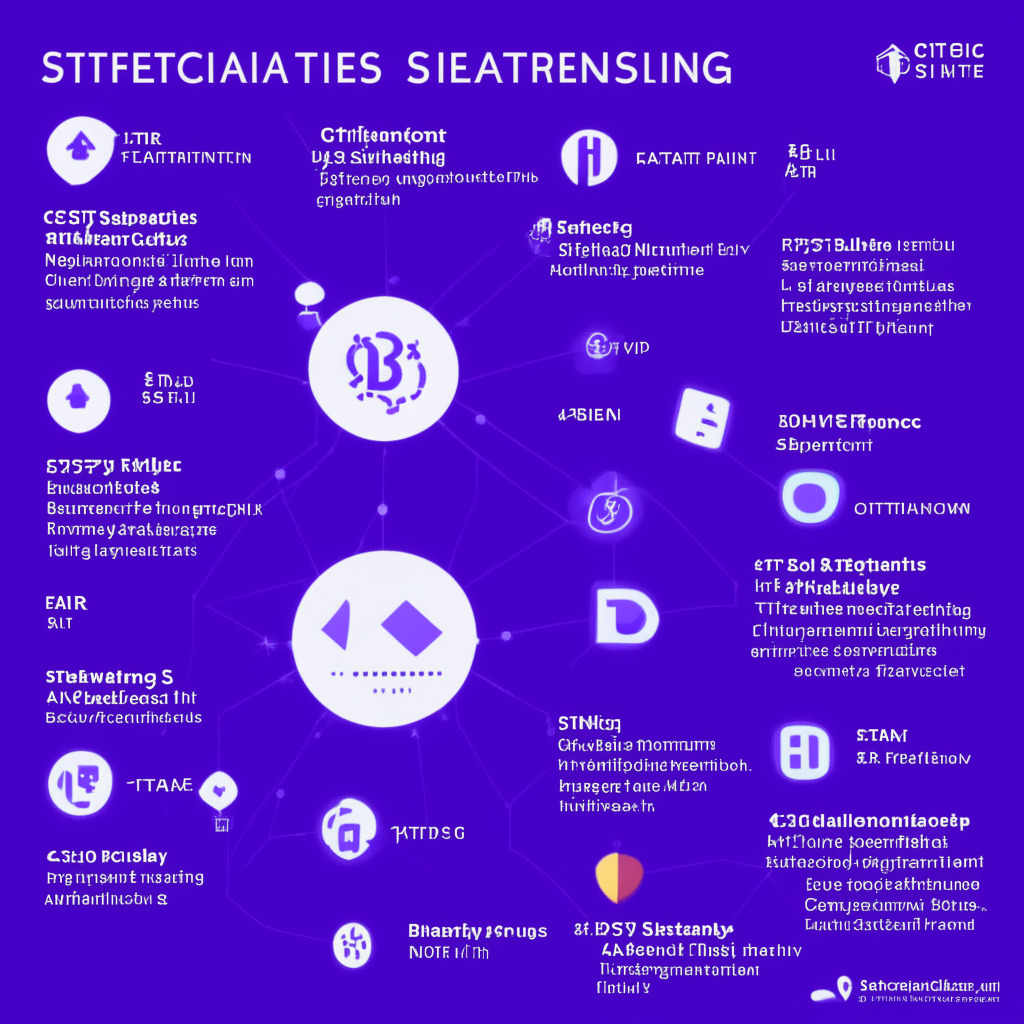Safe partners with P2P.org to simplify Ethereum staking, allowing users to maintain ownership of their digital assets and offering slashing protections. With this integration, entry barriers to staking are reduced, while fostering growth in the Decentralized Finance community. Users should consider potential risks associated with network vulnerabilities.
Search Results for: Safe
AI-Fueled NFT Analytics Provider Mnemonic Raises $6M: Exploring Web3 Integration and User Safety
Mnemonic, an AI-fueled NFT data and analytics provider, raised $6 million in a seed extension round led by Salesforce Ventures. The funds will be used to improve analytics, expand market reach, and develop its partner ecosystem. Salesforce plans to integrate Mnemonic’s technology into its Web3-related CRM products, enhancing data-driven decision-making for customers.
Crypto Heist Shocks Community: Atomic Wallet Loses $100M – How to Safeguard your Assets
Atomic Wallet faced a cyberattack resulting in over $100 million in losses, affecting 5,500 crypto wallets. Blockchain analysis company Elliptic attributed the theft to the Lazarus Group and highlighted the crucial need for enhanced security measures and vigilance in the growing crypto market.
The Great Blockchain Debate: Market Impact, Adoption, and Safety in a Digital World
This article delves into diverse aspects of blockchain technology, exploring its impact on markets and the challenges of safety in the digital realm. It encompasses the potential risks, benefits, and debate surrounding its development and adoption, while emphasizing the importance of education and informed decision-making.
Binance Fights SEC Asset Freeze: Customer Safety or Regulatory Overreach? Pros, Cons & Conflict
Binance.US and CEO Changpeng Zhao’s attorneys counter the SEC’s move to freeze assets, claiming there is no risk to customer assets. They argue that granting the SEC’s requested relief would significantly harm Binance.US clients and may end BAM Trading Services and BAM Management US Holdings operations. The outcome of the upcoming hearing could have major implications for Binance.US and its clientele.
Twitter 2.0: Balancing Unfiltered Dialogue and Online Safety under New CEO Yaccarino
New Twitter CEO Linda Yaccarino envisions Twitter 2.0 as a platform for unfiltered exchange of information and open dialogue. With a background in advertising, Yaccarino faces the challenge of balancing open dialogue with maintaining a safe, inclusive online environment.
DeFi Exploit Costs Sturdy Finance 442 ETH: Analyzing Security and Future Safeguards
Sturdy Finance, a DeFi lending protocol, recently suffered an exploit resulting in a loss of 442 ETH (around $768,800). The platform has paused activity for investigation. The attacker allegedly manipulated the price oracle of a collateral pool, draining funds from Sturdy using a re-entrancy attack.
Crypto Exchange’s Battle with Regulations: Impact on Markets and Safety in Nigeria and Beyond
Nigeria’s SEC declared Binance Nigeria Limited as “illegal” and ordered operations to cease. This follows Nigeria passing the Finance Act 2023, imposing a 10% capital gains tax on digital assets. Binance faces ongoing lawsuits, highlighting challenges for crypto exchanges in adapting to changing regulatory landscapes and emphasizing the importance of vigilance and awareness for market stability.
Massive $4B Outflow from Binance and Coinbase: Navigating the Crypto Chaos Safely
The cryptocurrency industry faces turmoil as Coinbase and Binance experience a $4 billion outflow due to SEC allegations, impacting the best cryptos to buy. Despite challenges, some cryptocurrencies like WSM, IMX, and ECOTERRA remain top contenders for investment, although caution is advised in this uncertain market.
Balancing AI Advancement: Unhindered Progress vs. Safe Development and Regulation
Marc Andreessen advocates for competition and open-source AI accessibility, while emphasizing collaboration between governments and the private sector to address AI’s potential risks. Balancing rapid development with judicious use and regulation is critical for AI’s future advancements.
Bitcoin Undervalued vs S&P 500: A Case for Catch-up Rally or Growing Safe-Haven Status?
A recent metric suggests Bitcoin is undervalued compared to the S&P 500 with a calculated fair value of 27,550. However, correlation between the S&P 500 and Bitcoin has weakened, pointing to its evolving perception as a safe-haven asset akin to gold.
Balancing Crypto Safety and Growth: Commonwealth Bank’s Restrictions on Payments to Exchanges
Australia’s Commonwealth Bank announces partial restrictions on payments to cryptocurrency exchanges to protect customers from scams. The bank will decline certain payments or hold them for 24 hours and set a payment limit of 10,000 Australian dollars per month.
Commonwealth Bank’s Crypto Payment Limits: Balancing Safety vs Market Growth
Commonwealth Bank (CBA) plans to reject or temporarily withhold specific payments to crypto trading platforms, setting a monthly limit of A$10,000 for customer payments to protect from scams. As regulations in Australia are considered, banks and governments strive to balance growing crypto interest with customer protection.
Terra LUNA Founder Do Kwon’s Legal Battle: Lessons for Blockchain and Investor Safety
Terra LUNA founder Do Kwon could face up to 40 years in prison for charges related to a $40 billion loss suffered by investors. Authorities prepare to bring Kwon to justice in South Korea and the US, as investigations into the LUNA token collapse reveal alarming findings. This case highlights the need for stringent oversight and caution in cryptocurrency investments.
The SEC, Regulatory Scrutiny, and Crypto: Striking the Balance Between Innovation and Safety
Regulatory scrutiny in the cryptocurrency world intensifies as the SEC charges Coinbase and Binance, two major crypto exchanges, for operating without proper registration. Despite this, Ark Invest maintains confidence in Coinbase, highlighting the potential benefits of increased regulation in fostering trust and promoting a secure financial landscape. The challenge lies in finding the right balance between regulation and innovation.
Binance Lawsuit Fallout Hits Crypto Space Hard, While Ecoterra Rises as Pre-Sale Safe Haven
The SEC vs. Binance lawsuit impacts major projects like BNB, SOL, MATIC, and ADA, causing market turbulence. Meanwhile, investors seek refuge in promising pre-sales like Ecoterra, an eco-friendly blockchain project. Amid uncertainties, research and cautious approach are essential for investments.
Binance.US SEC Saga: Safety Assurance, Regulation Clash, and the Crypto Community
Binance.US reassures users their assets are safe following SEC’s motion to freeze the crypto exchange’s assets. This raises questions on whether regulatory action is necessary for investor protection or hinders innovation and growth in the digital asset industry. The outcome could impact future crypto regulations and operations in the US.
Crypto Safe Havens Amid SEC Scrutiny: Memecoins and Eco-Friendly Projects on the Rise
Despite the recent SEC regulatory uncertainty, crypto prices are rising, with Bitcoin, Ether, and meme coins like Dogecoin and Shiba Inu among the beneficiaries. Investors may be shifting towards cryptocurrencies considered safe havens against regulatory risks, as continued development and investment in the US crypto sector promote adoption.
SEC Lawsuits Against Coinbase and Binance: Stifling Innovation or Ensuring Market Safety?
The SEC’s recent lawsuits against Coinbase and Binance highlight concerns that some crypto assets potentially meet criteria to be classified as securities, which may significantly impact the broader crypto market. Based on these allegations, the outcome of the lawsuits could set the tone for future cryptocurrency regulation in the U.S and emphasize the importance of a well-regulated and transparent market.
AI Developer Regulation Debate: Balancing Innovation and Safety Risks
The lack of regulation of AI development concerns Labour Party’s digital spokesperson, Lucy Powell, who calls for licensing and regulating AI like pharmaceutical, medical, or nuclear industries. As AI becomes more powerful, proper regulation and safety measures are essential to minimize risks and maximize benefits of this rapidly evolving technology.
AI Regulation Debate: Licensing Model Pros, Cons, and Balancing Innovation with Safety
UK officials propose licensing AI technology, similar to pharmaceutical or nuclear power companies, to regulate AI at the developmental level. The approach aims to address concerns about bias, discrimination, surveillance, and potential risks associated with AI technology.
SEC Accuses Binance of Violating Securities Laws: Impact on Crypto Industry and Market Safety
The US SEC has accused Binance, BAM Trading, and CEO Changpeng ‘CZ’ Zhao of violating securities laws, alleging that BNB, BUSD, and Binance.US staking investment products count as unregistered securities, and suggesting Binance has commingled customer funds. These allegations could have a significant impact on the crypto industry and potentially lead to monetary penalties.
Atomic Wallet Heist: Centralization vs Security & Balancing Convenience with Crypto Safety
The cryptocurrency industry faces another setback as nearly $35 million worth of tokens were stolen from Atomic Wallet, a centralized storage service. This raises questions about security in centralized wallet services and highlights the trade-offs between centralization and security in the crypto space.
Crypto Theft on the Rise: Atomic Wallet Hack and DeFi Exploits – How to Stay Safe
Users of Atomic Wallet reported crypto asset losses and complete disappearance of portfolios. Atomic’s team is investigating the issue. This highlights risks associated with blockchain technology, emphasizing the importance of ensuring safety, security, and educating oneself on secure practices.
Atomic Wallet Security Breach: Examining Trust and the Challenge of Ensuring Crypto Safety
Atomic Wallet, with over five million users, suffered a security breach resulting in users losing funds. On-chain investigator ZachXBT is assisting affected individuals. The breach questions the wallet’s security and highlights the challenge of achieving complete security in the decentralized financial landscape.
Bankrupt Crypto Lender’s $800M ETH Staking Move: Impact on Ethereum Validator Queue & Market Safety
Crypto lender Celsius Network’s $800 million Ether staking move has caused significant delays in the Ethereum validator queue, stretching it to 44 days. Following Ethereum’s Shanghai upgrade, Celsius reshuffled staked ETH holdings, potentially adding nearly a week of delay. This highlights the need for a more scalable and accessible network as Ethereum 2.0 transitions to proof-of-stake.
Unveiling the Uniswap Scam: How Crypto Enthusiasts can Stay Safe in a Deceptive Digital World
A recent scam involving a fake Uniswap website, impersonated executives, and deceptive links highlights the growing sophistication of cyber fraud targeting crypto enthusiasts. It is crucial for individuals in the crypto space to remain vigilant, verify website URLs, and double-check executive identities to protect themselves from such scams.
Uniswap Scam Exposes Sophisticated Deception: How to Stay Safe in Crypto
The crypto community experienced a sophisticated scam involving a fraudulent Uniswap website, complete with a fake Zoom recording featuring imposters posing as Uniswap executives. The incident highlights the importance of vigilance and thorough research in the ever-changing world of blockchain and cryptocurrency.
Unraveling Gate.io Insolvency Rumors: Analysing Connections and Implications for Crypto Safety
Cryptocurrency exchange Gate.io faces insolvency rumors linked to the troubled bridging platform Multichain. Despite these rumors, Gate.io maintains smooth operations and secure, efficient digital asset trading services. The situation highlights the importance of vigilance and informed choices in the crypto space.
Debt Ceiling Turmoil: Eroding Trust in USD and Bitcoin’s Journey as Safe-Haven Asset
Blackrock CEO Laurence Fink suggests that the US debt ceiling turmoil has eroded global trust in the dollar, potentially benefiting Bitcoin as a hedge against inflation and debt. Market analysts note Bitcoin’s utility as a finite-supply safe-haven asset, but caution that its future value remains uncertain due to market factors and ongoing events.
Navigating Decentralization for a Safe, Regulated Future: Maelstrom’s Strategy and Vision
In a recent interview, Akshat Vaidya, investment head of Maelstrom, discussed the fund’s focus on decentralization to avoid regulatory conflicts. Maelstrom invests in companies like Obol Labs, which offer mission-critical solutions addressing potentially huge markets, while keeping regulatory concerns at bay.
Regulatory Uncertainty in US Crypto Space – Driving Innovation Away or Safeguarding Interests?
Coinbase CEO Brian Armstrong emphasizes concerns over the lack of regulatory clarity on cryptocurrencies in the United States, arguing that restrictive policies drive innovation away and weaken national security. As countries worldwide adopt central bank digital currencies (CBDCs), the US may struggle to keep pace due to unclear regulations, potentially affecting national security and global financial dominance.































